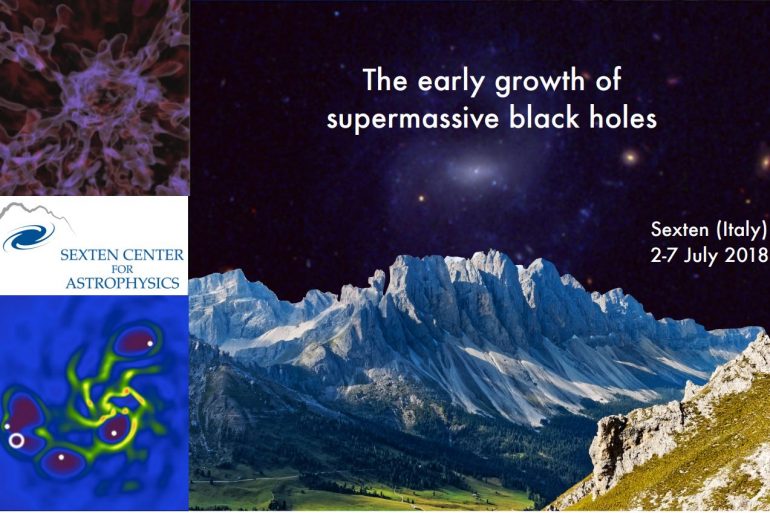
The early growth of supermassive black holes
LOCATION: Sexten Primary School - Via Panorama 6, Sexten
DETAILS
Understanding the formation and growth of supermassive black holes (BHs) is subject to intense research. BHs of more than 1 billion solar masses already powered luminous quasars when the Universe was only 0.8 Gyr old, suggesting that they had to grow from seed BHs at z > 7 and grow very rapidly. The models proposed for the formation of BH seeds include the remnants of the first population of massive (Population III) stars, the direct collapse of primordial gas, or mergers in dense stellar clusters. Observationally, the detection of such high-redshift BHs constitutes a serious challenge.
However, the leftovers of those seed BHs that did not grow into supermassive BHs can be found in the local Universe as intermediate-mass BHs of less than 1 million solar masses in e.g., dwarf galaxies, globular clusters, or ultraluminous X-ray sources, and can provide direct constraints on the seed BH formation models at z > 7. Intermediate-mass BHs also provide ample ground for studies of the low-mass end of the BH mass function, the behavior of the BH-galaxy scaling relations at low BH masses, the tidal disruption of stars, or the detection of gravitational waves.
This workshop aims at assembling theorists and observers to review the current status of models and observations and discuss the prospects of up-coming observatories for detecting seed BHs and discriminating between competing theories.
The format of the workshop allows ample time for presentations and for interactive work among the participants.
The specific topics that will be tackled are:
– Formation of seed BHs: models and predictions
– Detection of seed BHs at high redshift
– Observational evidence for intermediate-mass BHs in the local Universe
– The co-evolution of BHs and host galaxies in the low-mass regime
– Tidal disruption events and gravitational waves from intermediate-mass BHs
RELATED FILES
FEE
200 Eur - 120 for PhD students
WORKSHOP CODE FOR BUS AND PAYMENT
ORGANIZERS
Workshop leaders Mar Mezcua (Institute of Space Sciences, IEEC-CSIC) Raffaella Schneider (Sapienza University of Rome) Rosa Valiante (INAF/Osservatorio Astronomico di Roma) Email contact sesto2018bhseeds@gmail.com Confirmed Invited Speakers Bhaskar Agarwal (Universitaet Heidelberg, Zentrum fuer Astronomie) Vivienne Baldassare (Yale University) Volker Bromm (The University of Texas at Austin) Silvia Bonoli (CEFCA, Spain) Nico Cappelluti (Yale University) Francesca Civano (Harvard Smithsonian Center for Astrophysics) Monica Colpi (University of Milano Bicocca) Davide Fiacconi (IoA/Kavli, University of Cambridge) Simona Gallerani (Scuola Normale Superiore, Pisa) Elena Gallo (University of Michigan) Thomas Greif (Heidelberg Institute for Theoretical Studies) Melanie Habouzit (Center for Computational Astrophysics, New York) Takashi Hosokawa (Kyoto University) Kohei Inayoshi (Columbia University) Muhammad Latif (COMSATS University) Alessandro Lupi (Institut d'Astrophysique de Paris) Lucio Mayer (University of Zurich) Priya Natarayan (Yale University) Kazuyuki Omukai (Tohoku University) Fabio Pacucci (Yale University) Amy Reines (Montana State University) Shobita Satyapal (George Mason University) Tullia Sbarrato (University of Milano Bicocca) Dominik Schleicher (Universidad de Concepcion) Nathan Secrest (United States Naval Observatory, Washington) Alberto Sesana (University of Birmingham) David Sobral (Lancaster University) Bram Venemans (Max-Planck Institute for Astronomy, Heidelberg) Fabio Vito (Pennsylvania State University) Natalie Webb (IRAP)
